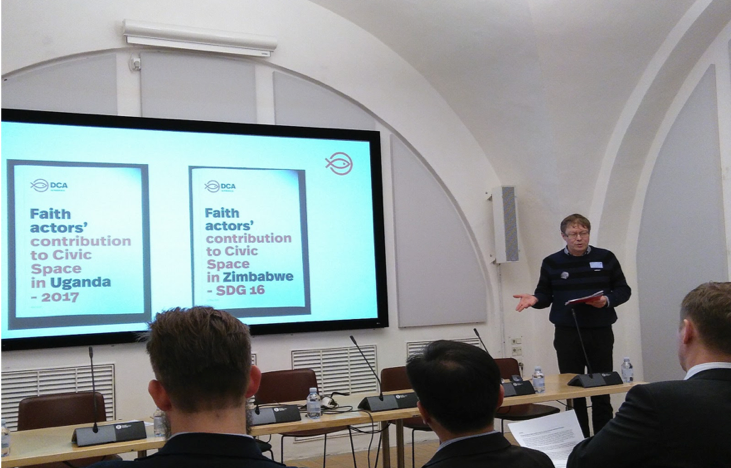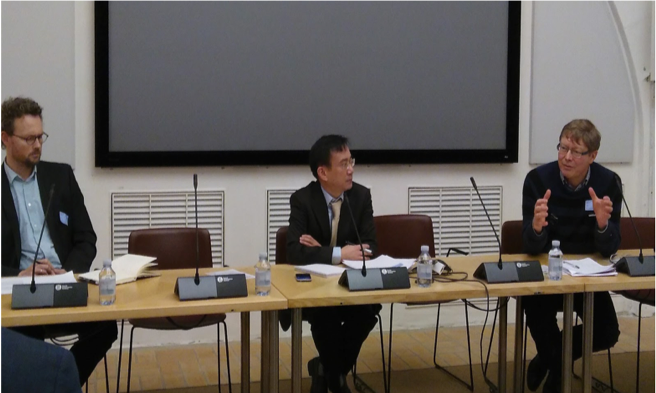Take-aways: The Right to Freedom of Religion and belief in a Shrinking Space
On December 6th 2018, Danish Mission Council Development Department and Global Focus hosted an event focusing on religious actors’ role in building and defending civic space. Speaking at the event were; Daniel Toft Jakobsen (Social Democrats, Cross-party Network of Religious Freedom), Michael Suhr (Danish Ministry of Foreign Affairs of Denmark), Jonas Adelin Jørgensen (Danish Mission Council), Jørgen Thomsen (DanChurchAid) and Vo Tran Nhat (Vietnam Committee on Human Rights).
Claiming the space for civil society
 Traditionally, churches have played an important role in setting the public agenda. A new study by DanChurchAid highlights the contribution of religious actors in Zimbabwe and Uganda to civic space. Churches played a proactive and constructive role in defending civic space despite restrictions to civic space by government actors. One of the conclusions from DanChurchAid’s study in Zimbabwe, Faith actors’ contribution to Civic Space in Zimbabwe - SDG 16, reads:
Traditionally, churches have played an important role in setting the public agenda. A new study by DanChurchAid highlights the contribution of religious actors in Zimbabwe and Uganda to civic space. Churches played a proactive and constructive role in defending civic space despite restrictions to civic space by government actors. One of the conclusions from DanChurchAid’s study in Zimbabwe, Faith actors’ contribution to Civic Space in Zimbabwe - SDG 16, reads:
“The report exemplifies influential church support to institutionalisation of freedoms of association, assembly and expression, as well as, of protection of human rights defenders and effective voter education and empowerment in the run up to elections.”
The churches have used an advocacy approach to actively mobilise the local communities and putting focus on issues such as human rights, electoral processes and peaceful conflict resolution. Faith leaders have also actively used social media platforms to spread their message to a larger audience. There are however challenges that are important to address. Where faith actors are strong supporters of civic space in some places, they can be strong opponents in other areas. Especially LGBTQI+ activists and feminist organisations have faced restrictions and violations from religious actors in many countries. Speakers suggested that this ambiguity can be addressed by involving religious actors in finding a solution and for example channel resources to local faith groups to advance civic space through education and collaborate with activists and other civil society actors.
The discussions at the event highlighted the necessity to acknowledge that the challenges and opportunities regarding religious actors and civic space are very context-dependent. What might be a positive strategy in one country can be very different in another country. Jørgen Thomsen from DanChurchAid explained:
“If the church is to be helpful for civic space defense, it requires that we develop and nurture a theological understanding of culture and society that gives us a mandate to speak to the public and informs us about what to say.”
 There are however some common denominators on what could be done. Since religious actors play an important role in affecting the value formation in society, it is important that these religious actors are not banned from organizing. Vo Tran Nhat from the Vietnam Committee of Human Rights described how this was happening in Vietnam:
There are however some common denominators on what could be done. Since religious actors play an important role in affecting the value formation in society, it is important that these religious actors are not banned from organizing. Vo Tran Nhat from the Vietnam Committee of Human Rights described how this was happening in Vietnam:
“The question of civic space in Vietnam is often a question of religious freedom because many religious people are banned from practicing their activism, just as independent NGOs are banned.”
There is therefore a need for inter-religious dialogue with representatives from different religious groupings to take into account when civic space is restricted. For instance, implementing sanctions against a government, such as ending funding, can be a useful tool but the consequences need to be taken into account. This can be done by consulting the local civil society and especially those at risk.
- Oprettet den .

